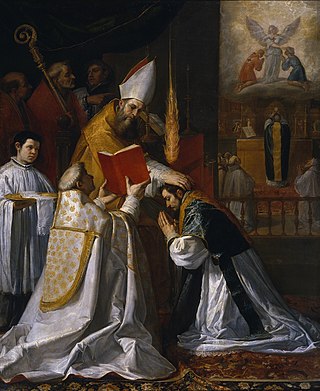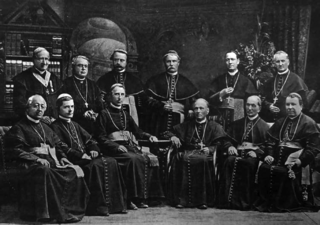Related Research Articles
A bishop is an ordained member of the clergy who is entrusted with a position of authority and oversight in a religious institution.

In certain Christian denominations, holy orders are the ordained ministries of bishop, priest (presbyter), and deacon, and the sacrament or rite by which candidates are ordained to those orders. Churches recognizing these orders include the Catholic Church, the Eastern Orthodox, Oriental Orthodox, Anglican, Assyrian, Old Catholic, Independent Catholic and some Lutheran churches. Except for Lutherans and some Anglicans, these churches regard ordination as a sacrament.

A priest is a religious leader authorized to perform the sacred rituals of a religion, especially as a mediatory agent between humans and one or more deities. They also have the authority or power to administer religious rites; in particular, rites of sacrifice to, and propitiation of, a deity or deities. Their office or position is the 'priesthood', a term which also may apply to such persons collectively. A priest may have the duty to hear confessions periodically, give marriage counseling, provide prenuptial counseling, give spiritual direction, teach catechism, or visit those confined indoors, such as the sick in hospitals and nursing homes.

Clergy are formal leaders within established religions. Their roles and functions vary in different religious traditions, but usually involve presiding over specific rituals and teaching their religion's doctrines and practices. Some of the terms used for individual clergy are clergyman, clergywoman, clergyperson, churchman, ecclesiastic, and cleric, while clerk in holy orders has a long history but is rarely used.

A deacon is a member of the diaconate, an office in Christian churches that is generally associated with service of some kind, but which varies among theological and denominational traditions. Major Christian churches, such as the Catholic Church, the Oriental Orthodox Churches, the Eastern Orthodox Church, the Scandinavian Lutheran Churches, the Methodist Churches, the Anglican Communion, and the Free Church of England, view the diaconate as an order of ministry.
A pastor is the leader of a Christian congregation who also gives advice and counsel to people from the community or congregation. In Lutheranism, Catholicism, Eastern Orthodoxy, Oriental Orthodoxy and Anglicanism, pastors are always ordained. In Methodism, pastors may be either licensed or ordained.

Ordination is the process by which individuals are consecrated, that is, set apart and elevated from the laity class to the clergy, who are thus then authorized to perform various religious rites and ceremonies. The process and ceremonies of ordination vary by religion and denomination. One who is in preparation for, or who is undergoing the process of ordination is sometimes called an ordinand. The liturgy used at an ordination is sometimes referred to as an ordination.
Clerical celibacy is the requirement in certain religions that some or all members of the clergy be unmarried. Clerical celibacy also requires abstention from deliberately indulging in sexual thoughts and behavior outside of marriage, because these impulses are regarded as sinful.

In Christianity, a minister is a person authorised by a church or other religious organization to perform functions such as teaching of beliefs; leading services such as weddings, baptisms or funerals; or otherwise providing spiritual guidance to the community. The term is taken from Latin minister. In some church traditions the term is usually used for people who have been ordained, but in other traditions it can also be used for non-ordained people who have a pastoral or liturgical ministry.
The hierarchy of the Catholic Church consists of its bishops, priests, and deacons. In the ecclesiological sense of the term, "hierarchy" strictly means the "holy ordering" of the church, the Body of Christ, so to respect the diversity of gifts and ministries necessary for genuine unity.
The Anglican Church of Southern Africa, known until 2006 as the Church of the Province of Southern Africa, is the province of the Anglican Communion in the southern part of Africa. The church has twenty-five dioceses, of which twenty-one are located in South Africa, and one each in Eswatini, Lesotho, Namibia and Saint Helena. In South Africa, there are between 3 and 4 million Anglicans out of an estimated population of 45 million.

The priesthood is the office of the ministers of religion, who have been commissioned ("ordained") with the Holy orders of the Catholic Church. Technically, bishops are a priestly order as well; however, in layman's terms priest refers only to presbyters and pastors. The church's doctrine also sometimes refers to all baptised (lay) members as the "common priesthood", which can be confused with the ministerial priesthood of the consecrated clergy.
Clerical celibacy is the discipline within the Catholic Church by which only unmarried men are ordained to the episcopate, to the priesthood in the Latin Church, and similarly to the diaconate. In other autonomous particular churches, the discipline applies only to the episcopate.
The Catholic Church does not promote or condone homosexual activity. The Catholic Church condemns same-sex sexual activity and denies the existence and validity of same-sex marriage. While the Church says it opposes "unjust" discrimination against homosexual persons, it supports what it considers "just" discrimination in the employment of teachers or athletic coaches, in adoption, in the military and in housing. The Catechism of the Catholic Church promulgated by Pope John Paul II considers sexual activity between members of the same sex to be a grave sin against chastity and sees homosexual attraction as objectively disordered. However, the Catechism also states that homosexuals "must be accepted with respect, compassion, and sensitivity".This teaching has developed through a number of ecumenical councils and the influence of theologians, including the Church Fathers.
The Roman Catholic Diocese of Aliwal is a diocese located in the city of Aliwal North in the Ecclesiastical province of Eastern Cape in South Africa.

Malcolm Patrick McMahon, OP, KC*HS is an English prelate of the Roman Catholic Church. Since 2014, he has been the ninth Archbishop of Liverpool. Previously, he was Bishop of Nottingham from 2000 to 2014.
The ordination of lesbian, gay, bisexual and/or transgender (LGBT) clergy who are open about their sexuality or gender identity; are sexually active if lesbian, gay, or bisexual; or are in committed same-sex relationships is a debated practice within some contemporary Christian denominations.

Peter Joseph Baltes was a German-born American prelate of the Roman Catholic Church. He served as bishop of the Diocese of Alton in Illinois from 1870 until his death in 1886.
A personal ordinariate for former Anglicans, shortened as personal ordinariate or Anglican ordinariate, is an ordinariate, a canonical structure within the Catholic Church established in order to enable "groups of Anglicans" and Methodists to join the Catholic Church while preserving elements of their liturgical and spiritual patrimony.
Joseph Kizito is an Ugandan-born Roman Catholic priest who was appointed as Bishop of the Roman Catholic Diocese of Diwali, in South Africa, on 15 November 2019.
References
- ↑ "Lobinger, Fritz 1929-". Contemporary Authors. Gale. 2009. Retrieved 18 June 2019– via encyclopedia.com.
- 1 2 Lobinger, Fritz (1 July 2011). "Die Jungen Kirchen und die Zukunft des Kirchlichen Amtes" . Retrieved 18 June 2019. Speech delivered 15 October 2008, Catholic Theological Faculty, University of Vienna
- ↑ "Gesandt bis an die Grenzen der Erde". Die Regensburger Domspatzen in Südafrika (in German). 11 March 2008.
- ↑ Baur, John (1994). 2000 years of Christianity in Africa: an African history, 62-1992. Paulines. p. 285.
- ↑ Dargie, David (January 1997). "Christian Music among the Africans". In Elphick, Richard; Davenport, Rodney (eds.). Christianity in South Africa: A Political, Social, and Cultural History. University of California Press. p. 321. ISBN 9780520209404 . Retrieved 18 June 2019.
- 1 2 Prior, Anselm (1993). "A Brief History of the Lumko Institute (1962 - 1999)". University of South Africa. Retrieved 18 June 2019.
- ↑ "Rinunce e Nomine, 29.04.2004" (Press release) (in Italian). Holy See Press Office. 29 April 2004. Retrieved 18 June 2019.
- ↑ "Südafrika – Das Land der Little Ten". Die Regensburger Domspatzen in Südafrika (in German). 2 April 2008.
- ↑ "The Lobinger Model of Teampriests". Association of Catholic Priests. 12 October 2017. Retrieved 18 June 2019.
- 1 2 Wooden, Cindy (30 January 2019). "Affirming celibacy, pope explains narrow possibility for married priests". Catholic News Service. Archived from the original on 29 March 2019. Retrieved 18 June 2019.
Explaining his thoughts in an article published in U.S. Catholic magazine in March 2010, Bishop Lobinger said, "The two kinds (of priests) would exercise two different roles. The elders would lead the community and administer the sacraments in their own community, while the (diocesan) priests would be the spiritual guides of elders in several self-ministering communities. The priests would thus serve the whole diocese, while the elders would serve only the community where they were ordained."
- ↑ "Press Conference on the Return Flight from Panama to Rome". Libreria Editrice Vaticana. 27 January 2019. Retrieved 18 June 2019.
- ↑ Keane, James T. (29 January 2019). "Explainer: Will Pope Francis allow married priests?". America . Retrieved 18 June 2019.
- Further reading
- Vellguth, Klaus (2005). Eine neue Art, Kirche zu sein. Entstehung und Verbreitung der Kleinen Christlichen Gemeinschaften und des Bibel-Teilens in Afrika und Asien[A new way of being a church. Creation and dissemination of the Small Christian Communities and Bible sharing in Africa and Asia] (in German). Freiburg: Herder. ISBN 978-3-451-28857-9.
- Steffen, Paul B. (2014). Centres of Formation and Evangelizing Ministry. Pastoral Institutes in Oceania and Africa. Siegburg: Franz Schmitt Verlag. ISBN 978-3-87710-541-2.
- Steffen, Paul B. (2014). "Lumko Institute: Towards building a participatory church". East Asian Pastoral Review. 51 (2): 109–139.